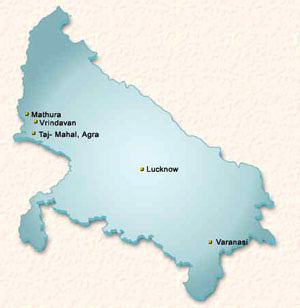Villagers in Uttar Pradesh get employment under rural employment act
 Darshan nagar village/Madna village (Faizabad), Apr 13: The Uttar Pradesh Government is involving villagers in digging of a sewage line and a pond to generate employment.
Darshan nagar village/Madna village (Faizabad), Apr 13: The Uttar Pradesh Government is involving villagers in digging of a sewage line and a pond to generate employment.
In Darshan Nagar village under the Purabazar province in Faizabad district, a sewage line is being dug in front of the concrete houses.
The construction work is being done under the National Rural Employment Guarantee Act (NREGA) promoted by the Ministry of Rural Development.
"Under the banner of NREGA, in our area, ponds and roads have been constructed and currently a 300 meter long sewage line is being constructed," said Ramkhelawan, village head, Darshan Nagar village.
The villagers are taking full advantage of this scheme by the Government.
"Earlier, I used to rush to Faizabad on a cycle for work. But now, I have got work near my home. There is no problem of food and children are also getting proper education," said Shrichand, a labourer.
In the Madna village under the same province, a pond is being constructed in the middle of the fields. But currently, the work is at a halt as the farmers are busy in cutting the grains.
"We will be receiving all the benefits from this pond which is being constructed by us under the scheme of NREGA. We will get money to feed our family, drinking water for our cattle and water for irrigation facilities. The Government is providing us benefits in every possible way," said Toofani, a farmer.
The NREGA, also known as National Rural Employment Guarantee Scheme (NREGS), was implemented in all 206 villages of Kullu District in April 2008.
Union Minister for Rural Development, Raghuvansh Prasad Singh had said that 2.7 million households have already been given employment for hundred days in the first phase of the NREGA scheme.
Around 3.6 million more households benefited in the second phase and another 2.7 million households in the third phase of the implementation of the scheme.
According to data available, 49 per cent of women, 30 per cent of Scheduled Castes and 25 per cent of Scheduled Tribes have benefited from the scheme so far.
In fact, this scheme, aims to tackle the problem of rural unemployment. It has also encouraged traditional handicraft industries, like textile weaving and bamboo work.
With elections round the corner, the effort is to spread awareness among rural households about their legal right to hundred days of employment every year under the scheme. (ANI)